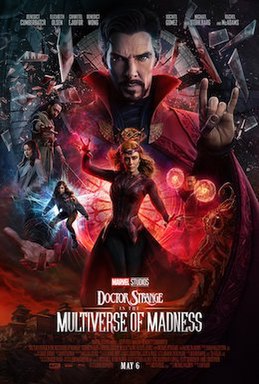Dimension-hopping
teenager America Chavez (Xochitl Gomez) arrives in New York pursued by demonic
creatures, drawing sorcerer Stephen Strange (Benedict Cumberbatch) away from his
colleague/former girlfriend Christine Palmer’s (Rachel McAdams) wedding.
Sensing witchcraft at play, Strange calls upon his friend Wanda Maximoff
(Elizabeth Olsen), only to find that she has been corrupted by the Darkhold, a
grimoire that convinces her that she can have the family she has been dreaming
about…by taking America’s power (killing her in the process) and relocating to
another dimension. To stop her, Strange, America, and Wong (Benedict Wong), will
seek allies in whichever dimension they can find them.
With
directors as distinctive and diverse as James Gunn, Taika Waititi, and Chloe Zhao
helming entries, one would think that criticisms of the Marvel Cinematic
Universe as cookie-cutter cinema would have waned by now. The addition of Sam
Raimi (replacing previous Doctor Strange director Scott Derrickson) suggests a
further corrective to that narrative. However, like Zhao’s Eternals, Raimi’s
stab at an MCU film is an awkward fit that shows a talented director not quite
hitting the mark.
On paper, Doctor
Strange in the Multiverse of Madness should have been a dream project.
After all, Raimi is beloved for the first two Spider-Man films, and he cut his
teeth as a horror director well before then. A project that combines both seems
like a no-brainer. Moreover, writer Michael Waldron experienced more recent
Marvel success with last year's Loki series. Add a Danny Elfman score
and lots of returning faces, and what could go wrong?
The
answer, sadly, is a lot. Pointing out the MCU’s interconnectedness and reliance
on prior familiarity is beating a dead horse, but despite drawing from that
shared history, Doctor Strange in the Multiverse of Madness doesn’t
seem to understand it. In WandaVision (which ended with the character using the
Darkhold), Wanda committed heinous and destructive acts, but Olsen delivered a
complex, anguished performance. Here, the character is more powerful yet feels
cheapened and one-dimensional, a dark magic-empowered Terminator with T2
Sarah Connor’s motives. This character neglect extends to Strange as well. The
character is once again chided as being an arrogant risk-taker, the one who
always has to be holding the knife. For most of the movie, he justifies that
reputation rather than challenging it, only breaking from it in the form of a
cliched late-game pep talk. Neither Olsen nor Cumberbatch are mailing it in
here and embody the characters as best as they are able; they just don’t have a
ton to work with. The Illuminati – a well-intentioned but secretive and
ethically dubious council featuring some of Marvel’s heavy hitters – shows up
in one of the film’s visited dimensions, but don’t get too attached. Their brief
appearances are part fan service, part Marvel bragging about the character film
rights they have reacquired, part inflating the danger an out-of-control Wanda
poses, and part Raimi utilizing his penchant for shockingly violent slapstick.
Undoubtedly, some of these faults can be pinned on a script that seemed to change
by the day during production, but even with a more solid plan from the get-go, Raimi’s
type of conspicuously comic booky superhero film would have been a better fit
for audiences fifteen years ago than audiences today.
While the
film arguably wastes its characters, one can still see where the money went. Even
as MCU films become more and more visually audacious, Raimi’s work here stands
out. It captures some of the exhilaration of his Spider-Man films, but
its also fluid, getting weird and wacky or darkly terrifying as the occasion
demands. Elfman’s score is serviceable and perhaps a good complement to Raimi’s
throwback approach, but it isn’t particularly memorable.
To borrow
the film’s central conceit, in a dimension where the Marvel Cinematic Universe
didn’t exist, Doctor Strange in the Multiverse of Madness would be a thoroughly
entertaining if weird and wonky two hours. But in our reality, it doesn’t measure
up to the expectations created by what came before, rendering it a frustrating –
if also at times thrilling and daring – outing. At the very least, however, it leaves the
door open for further adventures featuring these characters, hopefully by a
creative team that will better utilize them.



_logo.jpeg)
